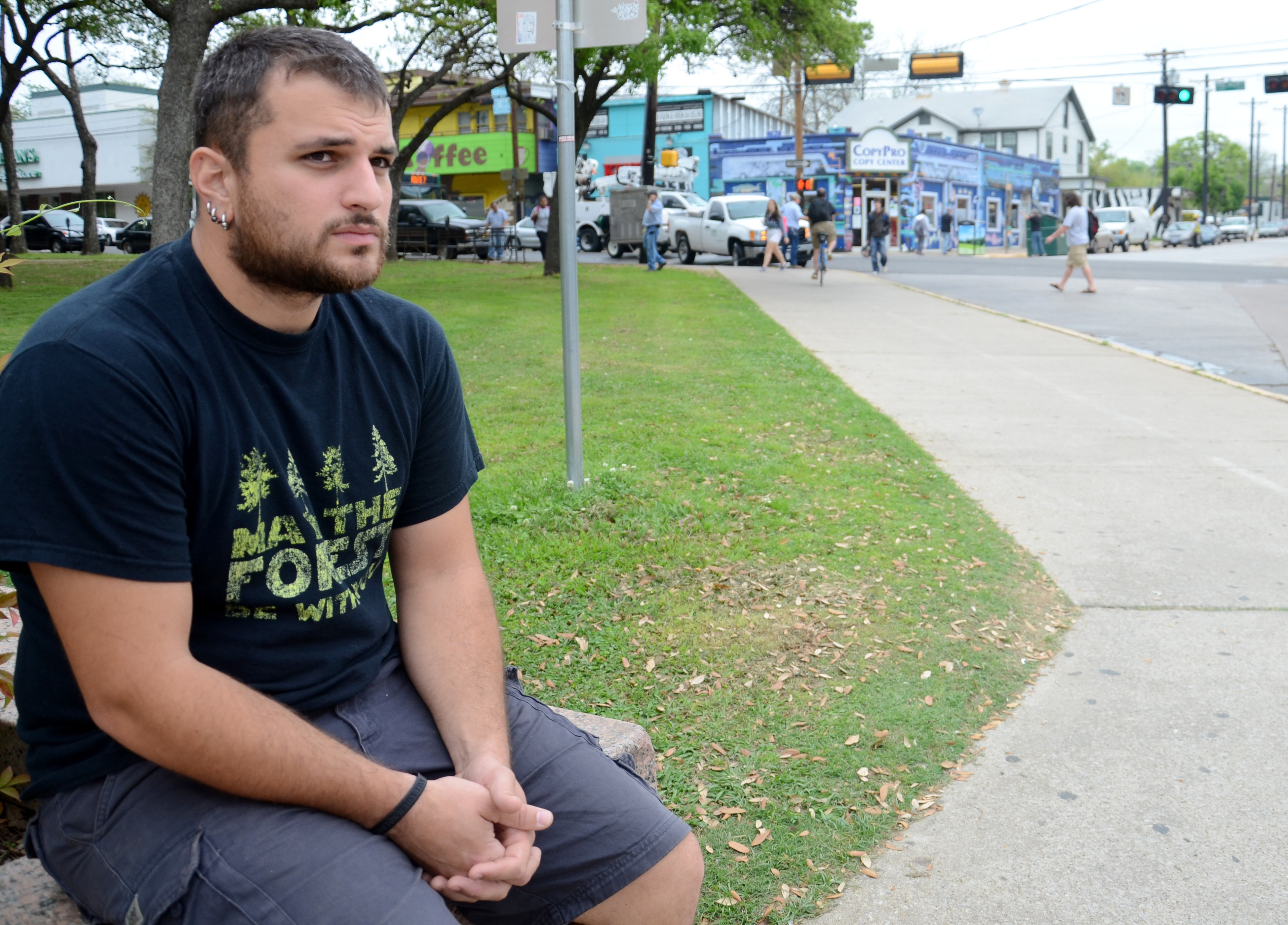North Texas environmental activists frequently feel as though local officials ignore their protests against gas drilling, but it turns out it’s easy enough to get the federal government’s attention — if the FBI thinks you might be planning eco-terrorism.
That’s what happened to University of North Texas student Ben Kessler, a Marine veteran and dedicated activist on fracking, who spent several months last fall dodging FBI phone calls that he felt were attempts to intimidate him and pump him for information about legitimate, peaceful environmental groups. Kessler is an organizer with Rising Tide, an international network of environmental groups that sometimes employ civil disobedience as a protest tactic.
In early February, an FBI agent and Dallas police officer came to campus to question one of Kessler’s professors as well. David Rogers, the FBI agent who called Kessler repeatedly, told him the agency was following up on an anonymous tip about environmental activism in the area.
“The first conversation we had, he was kind of lecturing me about ecoterrorism,” Kessler said. “All of the following conversations were him basically trying to convince me that I didn’t need a lawyer and should try to come in as soon as possible.”
For Rising Tide leaders, the monitoring by federal law enforcement sends a clear message: Back off. “We saw that as an act of intimidation,” said Scott Parkins, a spokesman for Rising Tide North America.
Lydia Maese, the spokesperson for the FBI’s Dallas office, would not confirm whether the agency was conducting an investigation. It’s FBI policy to conduct at least a preliminary investigation of any tip, she said, though she acknowledged that not every anonymous call results in an agent spending months trying to contact a college student and his associates.
“We do investigate any potential ecoterrorism violations that could potentially cause harm to the public,” Maese said. “We do this hundreds of times. We are obligated to resolve the matter.”
Both Kessler and the professor described Rogers as a polite, seemingly well-meaning person just trying to do his job. They said Rogers repeatedly told them the agency was in no way trying to curb free speech activities.
But when federal agents start questioning you about terrorism, it’s difficult not to feel intimidated, they said.
Kessler is still a little shaken.
“I was fucking scared shitless,” he said. “This whole period was very stressful. I thought they were going to invade my house.”
Kessler said Rogers told him on the phone that the agency was concerned about groups like Earth Liberation Front and Animal Liberation Front, which in years past have destroyed private property.
[pullquote_right]“There’s a concern, not just that I get written off as a nutty ideologue, but that Ben and other protesters are written off as crazy, violent terrorists,” he said. [/pullquote_right]Kessler has been arrested twice for civil disobedience, both times at nonviolent protests in Washington, D.C. But he doesn’t see the connection between eco-terrorism and his protests of tar sands oil pipelines or gas drilling next to Denton residential neighborhoods.
“The implication is that you move from doing marches and protests and sit-ins to setting buildings on fire, that that’s a logical step that normal people take,” he said. “No one I’ve worked with has ever threatened property destruction. We’ve never flipped a trashcan or broken a window… . [The FBI agent] was going to ask me who I protest with, what groups I’m involved with … that’s none of their business.” He questions whether the FBI even got the alleged tip.
Fellow environmental activist “Texas” Sharon Wilson, who writes the blog Bluedaze: Drilling Reform, saw the FBI’s web address pop up on her site-management system in November, a few months after Kessler received the first phone call from the FBI.
The agency had searched for “Ben Kessler” and “tar sands,” leading to her article about the August protest in Washington, D.C., of the Keystone XL pipeline, at which she, Kessler, and about 1,200 others were arrested for civil disobedience (see cover story, page 10). The UNT student was also specifically listed in searches of her website by various oil and gas companies, Wilson said.
“This is about more than the FBI,” she said. “They’re trying to intimidate and silence the opposition.”
The FBI has labeled ecoterrorism as the top domestic terror threat since at least 2005. That puts “highly destructive ecoterrorists” above “hate-filled white supremacists,” “violence-prone anti-government extremists,” and “radical separatist groups” — descriptions from a 2009 FBI press release on the agency’s website.
The federal agency also monitored members of Rising Tide North America in Moscow, Idaho, when they blockaded truck shipments of drilling equipment for extracting oil from Canada’s tar sands. Federal agents worked with local police to monitor the protesters’ activities.
“They’re doing MLK, Gandhi-style civil disobedience,” said Parkins. “People are constantly going to hearings and filing lawsuits and talking to elected officials about fracking, but you don’t see the FBI investigating gas companies about those problems.”
As for Kessler, he never met in person with the FBI. He contacted a lawyer — despite Rogers’ attempts to convince him that was unnecessary — and was told he could refuse to go in for questioning.
UNT philosophy professor Adam Briggle never got that chance. About a month after Kessler’s last contact with Rogers in January, the FBI agent and a Dallas police officer showed up at Briggle’s office and spent a half-hour discussing ecoterrorism. They asked the professor about assigning class readings on civil disobedience and about his own activism regarding gas drilling.
Briggle teaches an ethical theory course that discusses ethical problems such as environmental degradation. He doesn’t teach his students how to make bombs, but rather about the philosophy behind nonviolent protests.
The law enforcement officers asked Briggle about his involvement with the Denton Stakeholder Drilling Advisory Group, a group of residents lobbying the city council to stop issuing permits for gas drilling until potential environmental impacts are studied.
The agent and police officer also asked the professor about Kessler, who took his ethical theory course, and about some of his assigned readings. Oh, and they also asked him about IEDs, improvised explosive devices of the sort used by insurgents in Iraq and Afghanistan.
“A question like that is so out of left field, it just sort of stuns you,” Briggle said. “It seemed like this was about Ben, not me. … The Dallas police guy said they just wanted to make sure everyone was ‘playing nice in the sandbox.’ ”
Briggle said the officers seemed mainly to want him to contact them if he observed the potential for violent behavior by a student or activist. The professor described Kessler as an intelligent leader of nonviolent student protests.
“There’s a concern, not just that I get written off as a nutty ideologue, but that Ben and other protesters are written off as crazy, violent terrorists,” he said.
Questioning students and professors, even for the best reasons, could have a chilling effect on free speech, said Matthew Esbaugh-Soha, a political science professor at UNT who believes such interviews raise concerns about academic freedom.
“It can be of itself very intimidating. You think, ‘Does this mean I’m on the list?’ he said. “It’s our job to raise controversial issues to [encourage] reflection by our students and get them to think critically about what happened and why.”
Kessler said he has no plans to stop protesting oil drilling in his neighborhoods and across the country. He continues to work with Rising Tide North Texas in an attempt to influence city policy.
“We can’t let the intimidation stop us from doing what we’re doing,” he said. “The kind of people that are drawn to this work aren’t going to get deterred.”












